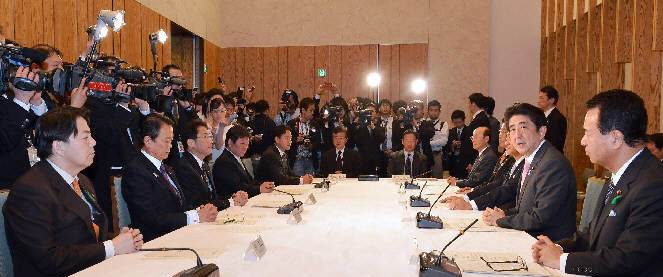
-
The Japanese government announced Friday, April 12, that it has reached agreement with the United States government on preliminary negotiations, paving the way to join talks on the Trans-Pacific Partnership. As the U.S. was the biggest obstacle for Japan in joining the trade liberalization talks, all the other TPP participating countries are highly likely to approve Japan’s participation. On the other hand, in an effort to join the talks in haste, Japan made an apparent concession in such areas as automobiles. This means Japan has given away most of the cards before engaging in the TPP negotiations, and is likely to face a difficult phase in gaining exceptions from tariff eliminations for the key agricultural products.
After the meeting of ministers concerning the TPP talks held the same day, Prime Minister Shinzo Abe told reporters that “Japan’s national interest is firmly protected” in the agreement. “The real negotiation starts from now, and we hope we can formally join the negotiations at an early time and lead the rule-making process,” Abe said.
In the bilateral agreement, Japan agreed that U.S. tariffs on imports of Japanese motor vehicles will eventually be phased out, but noted they will be “back loaded” to the maximum extent. The two countries also agreed to hold a bilateral negotiation for the automotive market in parallel with the TPP talks, as the U.S. expressed concerns for Japan’s non-tariff measures such as sales networks, safety standards and subsidies.
The Ministry of Land, Infrastructure, Transport and Tourism also decided to increase the number of motor vehicles eligible for import under its Preferential Handling Procedure (PHP), a simpler and faster certification method often used by foreign automakers with small sales. Foreign auto producers will be allowed to export up to 5,000 vehicles annually of each vehicle type, compared with the current annual ceiling of 2,000 vehicles. This was a deregulation measure the U.S. has been seeking for.
In the insurance sector, the U.S. government was expressing concern about the approval of new life insurance products by the state-owned Japan Post group, saying that it is virtually government-guaranteed. Finance Minister Taro Aso said in a press conference earlier in the day that the government intends not to authorize the sale of new medical insurance products by Japan Post Insurance Co. “Even if there are applications for approval of cancer insurance or single medical insurance products, we will not approve them unless we can determine that fair competition is ensured for the private insurance companies,” Aso said.
The documents exchanged by the two governments on the agreement state that the two sides acknowledged their mutual “trade sensitivities,” such as certain agricultural products for Japan and certain industrial products for the U.S. Japan also agreed to continue bilateral negotiations on a broad range of non-tariff measures in nine areas including insurance, trade facilitation, transparency, investment, intellectual property rights, standards, government procurement and Sanitary and Phytosanitary measures. The agreement notes that Japan implement the results of the parallel negotiations through specific steps such as legally binding agreements and law amendments.
U.S. President Barack Obama is now expected to seek approval by the Congress, which holds the trade negotiation power, to formally allow Japan in to the TPP talks. As the process is expected to take 90 days, the earliest Japan can join the formal negotiation will be July. The Japanese government was aiming at reaching agreement at this timing, as the meeting of the TPP participants is being planned in July.
Akira Amari, minister in charge of the TPP talks, told a press conference the same day that the U.S. government will immediately ask for congressional approval as well as official nods from other TPP negotiating countries, but refrained from mentioning exact dates.
(April 13, 2013)
“Wagyu Olympics” which judges the excellence of branded cattle from all over Japan took place.
Watch and try to unveil the mystery of Japanese Wagyu. English, French and Chinese Subtitles are available (Spoken only in Japanese).-
Most Popular(Last 30 days)
- Japan’s exports of green tea increase by 50 percent in five years 71 views
- Two-ton giant snake made of straw and bamboo paraded to protect locals 65 views
- A company in Tokyo develops fully-enclosed vegetable factory 64 views
- 【News】Inbound tourists going rural to experience life of Japanese farmers (Apr. 1, 2017) 58 views
- ZEN-NOH completes lineup of Nippon Yell brand gummy candies from Japan’s all 47 prefectures 50 views
- Japan-made bananas attracting attention with development of nontropical plants 43 views
- New columnar apple variety developed in Japan 42 views
- Lisianthus flowers have scent components that attract cats like silvervine: NARO’s research reveals 40 views
- It’s mysterious circles in Japan! Drone captures circles of trees 37 views
- Osaka earthquake shakes farm businesses in western Japan 37 views
Tags
Archive

